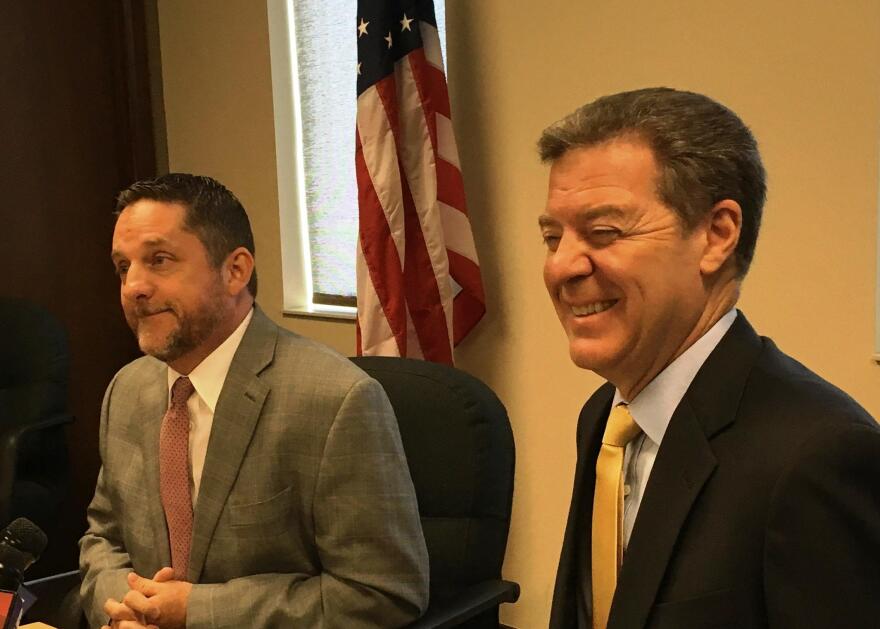Earlier this summer, Jeff Blackwood started the process of moving his business to Kansas City, Missouri -- and out of Overland Park, Kansas. But first, he had something to say.
“I could have just moved and not said anything," Blackwood says. “There’s really no benefit to me in having said anything, but it comes down to conscience.”
Blackwood posted an open letter to Kansas Gov. Sam Brownback, lambasting the 2012 huge income tax cuts, the ones promoted and signed by the governor four years ago, the ones that zeroed out income taxes for many small businesses.
Blackwood’s company, Pathfinder Health Innovations, writes software for autism treatment centers. And Blackwood blames those tax cuts for, among other things, strangling his would-be customers in the state.
"We’ve got customers across the country...(but) we have none in Kansas. Because the therapy providers here can’t afford our products," he says.
Blackwood says that’s in part because Kansas has slashed health care funding to address a budget crisis caused by the tax cuts. This stalled reimbursements to clinics.
It seems the tax-cut gift from the governor -- billed as a "shot of adrenalin" for the economy with the promise of tens of thousands of jobs-- has turned sour for some businesses.
The impact of spending cuts
Blackwood says his decision to move out of Kansas was more about ideology than dollars and cents. But Brian Hanson, president of Dustrol Inc., a road resurfacing company based near Wichita, is exporting employees and equipment out of Kansas as a matter of financial survival.
“Fortunately for us we have the capability of working in some other states,” says Hanson. “So we’ve been able to shift personnel and assets out of Kansas.”
Road work has dried up in Kansas. Despite the impression you might get commuting in the Kansas City area, Kansas has diverted more than $2 billion from transportation funds to patch other budget problems. That’s left the state’s road work firms scrambling for work in other states, where they compete against displaced Kansas firms, as well as the local guys.
Bob Totten, with the Kansas Contractors Association, says Kansas lost 3,400 construction jobs last year, suffering one of the nation’s biggest construction industry contractions.
“We’re cutting people. We’re moving to Nebraska. Our operations are moving somewhere else, because we don’t have the work here in Kansas,” he says.
Totten says contractors would gladly give back the income tax cuts if they could restore funding to state government. To make matters worse, he says, contractors are still operating in Kansas are paying much more for all the stuff they use, thanks to sales tax hikes passed to help plug the budget holes.
Still, as Gov. Brownback points out, unemployment is very low in Kansas, just over 4 percent, below the national average.
And the governor has had some positive good news to tell about the economy. Last month, for instance, he announced that Amazon is building a fulfillment center in the middle of Kansas City, Kansas, and bringing 1,000 new jobs to the area. That came on top of another thousand jobs Amazon has pledged to create with another new facility in Edgerton, Kansas.
“This is good news of great growth to take place in this state,” said Brownback at the Amazon press conference. “(The) Kansas City region has been one of the fastest growing regions in the state, and I’m delighted to see it continue.”
And Brownback says small business creation is way up -- 17,000 new businesses just last year. But, the new businesses he’s counting, include individuals who simply reorganized to take advantage of the income tax cuts. Kansas job growth has been lackluster, and the state’s gross domestic product, the measure of all business activity in the state fell last year, even as most of the rest of the country grew. Low prices for farm commodities and oil, contributed to that. The aviation industry, in Wichita, has been sluggish too.
But that’s not the whole story.
Economy struggling
Frank Lenk, director of research services at the Mid America Regional Council, says the Kansas economy is struggling, and that the economic malaise has spread to the perennial hot spot of the state economy.
“Johnson County’s bread and butter is in professional services growth, and for whatever reason, that growth seems to be stalling a bit, over the last year,” Lenk says.

In fact, it’s been a dramatic reversal. Because after decades of leading the Kansas City metro area in job growth, Johnson County (in Kansas) last year fell behind Jackson County (in Missouri). Way behind. Lenk says Jackson County added close to twice as many jobs as Johnson County did.
“Can you tie that to a tax policy? Probably not,” cautions Lenk. “There’s a lot of other things going on in the economy besides taxes.”
But Lenk says that when the health care, roads and dozens of other services are cut, when classroom funding stagnates, it slices into the foundation of Johnson County’s success: high quality of life.
“It’s not the taxes themselves, but what the tax policy might be doing to the ability to provide high quality services , that could be having an impact. We don’t have enough data to verify that assertion at this point, but that’s consistent with the stories that you are hearing,” Lenk says.
Jeff Blackwood’s story, for instance. Blackwood completed his move to Missouri a couple of weeks ago. He says his employees are enjoying their new space in the Crossroads district in downtown Kansas City, and the lively, entrepreneurial vibe there. Meantime he’s brought on three new hires, and is already plotting another expansion.
Frank Morris is a national correspondent and senior editor at KCUR 89.3. You can reach him on Twitter, @FrankNewsman.


